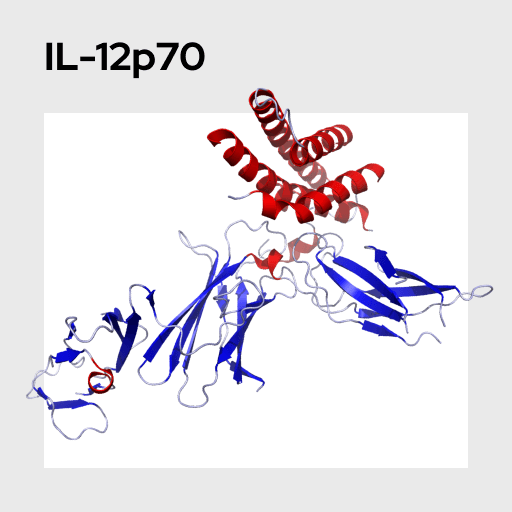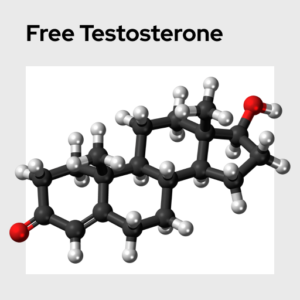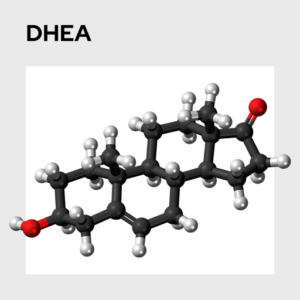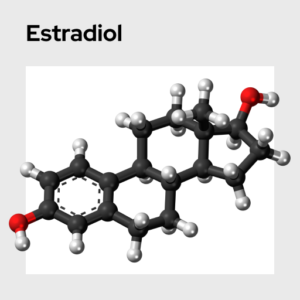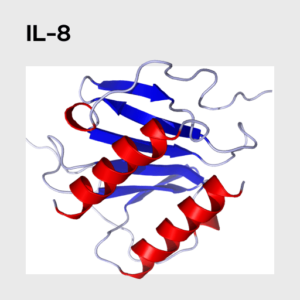Interleukin 12p70 (IL-12p70)
Interleukin 12p70 (IL-12p70) is pleiotropic proinflammatory cytokine that plays an important role in regulating immunological function. Produced predominantly by dendritic cells, monocytes, macrophages, and T lymphocytes, IL-12p70 activates and links the activities of the innate and adaptive immune responses. IL-12p70 is an important regulator of Th1 responses, promotes the expansion and survival of activated T-cells and NK cells, and modulates the cytotoxic activity of cytotoxic T lymphocytes and NK cells. Because levels of this cytokine are typically low in the blood of healthy people, measuring this cytokine in serum or plasma may require an ultra-sensitive assay. This analyte is eligible for multiplexing.
Name: Interleukin 12p70 (IL-12p70)
Category: Health & Inflammation
Type of test: Blood + Saliva
IL-12p70 is a heterodimeric pro-inflammatory cytokine that is produced primarily by antigen-presenting immune cells such as monocytes and macrophages. Signaling related to the IL-12 receptor has been shown to be important for the body's immune response to both infectious diseases as well as cancer, and as a result there has been much research focusing on the possibility of administering IL-12p70 as a potential cancer treatment. Its anti-cancer activity is primarily related to its ability to activate NK cells and adaptive T lymphocytes, which contribute to the innate and adaptive immune responses, respectively. Due to this two-pronged activity, many view IL-12p70 as an important link between the adaptive and innate immune systems. However, treatments focused on IL-12p70 have shown mixed results due to adverse effects related to its proinflammatory activity outside of target tissues.
Mechanistically, the pathway for secretion of IL-12p70 is largely unknown in macrophages, but it is assumed to be similar to IL-6 and TNF, specifically with regard to golgi transport and exocytosis. Through stimulating the production and release of IFN‐γ, IL-12p70 signaling overlaps with CXCL10 production, a chemokine that limits angiogenesis and has been investigated for potential therapeutic applications in cancer therapy. IL-12p70’s ability to stimulate IFN‐γ production is linked to additional processes as well, working synergistically with other immune cells to stimulate T helper 1 cells and recruit phagocytic immune cells. This IFN‐γ related signaling is also involved with disorders related to immunodeficiency, as an inability to express sufficient IFN‐γ in response to either acquired or novel immune stimuli leads to an increased prevalence of infectious disease. For this reason, low levels of IL-12p70 may be considered a risk factor for developing severe disease related to infection. However, high levels may contribute to autoimmune diseases such as rheumatoid arthritis and other states of chronic or inflammation.
Decidedly, IL-12p70 is critical for viral and bacterial immunity, but more research is needed to determine whether localized administration can be implemented in cancer and infectious disease treatment without dangerous side effects. Recent research has indicated that successful treatment of disorders, such as schizophrenia, depression, and bipolar mania, leads to a reduction in patients’ levels of IL-12p70. This suggests that IL-12p70 signaling may play an important role in regulating brain health, with elevated levels contributing to psychological disorders. IL-12p70 can be measured in both saliva and serum / plasma, but the extent to which levels in these sample types correlate is variable.
Del Vecchio, M., Bajetta, E., Canova, S., Lotze, M. T., Wesa, A., Parmiani, G., & Anichini, A. (2007). Interleukin-12: biological properties and clinical application. Clinical Cancer Research, 13, 4677-4685. https://pubmed.ncbi.nlm.nih.gov/17699845/
Gee, K., Guzzo, C., Che Mat, N. F., Ma, W., & Kumar, A. (2009). The IL-12 family of cytokines in infection, inflammation and autoimmune disorders. Inflammation and Allergy-Drug Targets, 8, 40-52. https://pubmed.ncbi.nlm.nih.gov/19275692/
Méndez-Samperio, P. (2010). Role of interleukin-12 family cytokines in the cellular response to mycobacterial disease. International Journal of Infectious Diseases, 14, e366-e371. https://www.sciencedirect.com/science/article/pii/S1201971209002793
Verma, N. D., Hall, B. M., Plain, K. M., Robinson, C. M., Boyd, R., Tran, G. T., ... & Hodgkinson, S. J. (2014). Interleukin-12 (IL-12p70) promotes induction of highly potent Th1-like CD4+ CD25+ T regulatory cells that inhibit allograft rejection in unmodified recipients. Frontiers in immunology, 5, e190. https://www.frontiersin.org/articles/10.3389/fimmu.2014.00190/full


